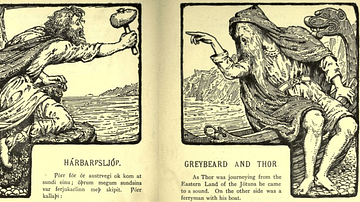In the realm of Norse mythology, a fierce contest has unfolded between two powerful deities – Odin and Thor. This clash of gods has captivated believers for centuries, but it is not merely a tale of divine rivalry. Rather, it represents a profound struggle for supremacy that transcends the realms of myth and enters the domain of legal discourse.
A Divine Dispute Unveiled
At its core, this epic battle revolves around an age-old question: who holds ultimate authority in Asgard? While both Odin and Thor are revered figures within the pantheon, their differing roles have sparked heated debates among theologians and scholars alike. Odin, known as the Allfather and ruler of Asgard, embodies wisdom, knowledge, and magic. On the other hand, Thor stands as the god of thunder and strength – a mighty warrior whose hammer strikes fear into his enemies.
This dispute reached its zenith when Odin sought to assert his dominance over all realms by invoking ancient laws that granted him supreme power. However, Thor vehemently contested these claims with equal fervor. The ensuing legal battle would test not only their divine might but also challenge established norms within their celestial society.
The Legal Maze Unraveled
As this conflict escalated to unprecedented heights in Valhalla’s hallowed halls, legal experts from across mythical lands were summoned to decipher archaic texts outlining divine jurisdiction. These sacred scrolls revealed intricate clauses pertaining to succession rights and hierarchical structures within Asgardian governance.
Odin’s supporters argued that his position as Allfather bestowed upon him unparalleled authority over all aspects of existence – mortal or otherwise. They cited ancient edicts proclaiming his sovereignty as well as precedents set by previous rulers who had wielded similar powers. Conversely, Thor’s advocates contended that his role as the protector of Midgard and defender of humanity granted him a unique claim to authority.
As legal scholars delved deeper into this celestial conundrum, they discovered an intriguing clause within Asgardian law – the “Trial by Thunder.” This provision stipulated that in times of divine dispute, a contest would be held to determine the rightful ruler. The gods would engage in a series of trials and challenges, testing their mettle and proving their worthiness before an impartial jury comprised of fellow deities.
A Verdict for Eternity
The Trial by Thunder commenced amidst great anticipation throughout the realms. Odin and Thor faced each other on equal footing, stripped of their godly powers but armed with unwavering determination. They engaged in fierce combat, displaying valor and resilience beyond mortal comprehension.
After days filled with grueling tests encompassing strength, wisdom, bravery, and compassion – virtues cherished by both gods – a verdict was reached. The divine jury unanimously declared Thor as the victor – not only for his indomitable spirit but also due to his unwavering commitment to protecting mortals from harm.
This historic ruling forever altered the balance of power within Asgard while reaffirming its commitment to justice through lawful means. It serves as a testament that even among gods embroiled in conflict, adherence to established legal frameworks can prevail over personal ambitions or desires.

